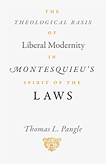• Home | • Curriculum Vitae: » PDF | • Return to Books & DVD


The Theological Basis of Liberal Modernity in Montesquieu's "Spirit of the Laws"
University of Chicago Press, 2010
How, if at all, can liberal rationalism validate its most basic normative premises in the face of illiberal, theocratic challenges premised on the authority of divine revelations which purport to override or to subordinate reason? This philosophic riddle is posed in the twenty-first century more acutely than it has ever been before. But the puzzle was originally confronted, and responded to with subtlety and power, in the writings of the political philosophers of the Enlightenment. This book offers a dramatic new interpretation, and subsequent critique, of the foundational, theologico-political teaching of what is by far the most comprehensive and influential of the treatises that laid the theoretical basis for our modern constitutional government. Montesquieu's didactic rhetorical strategy is explicated in light of the Frenchman's fraught historical context of authoritarian religious intolerance and persecution. Using this key to the sinuous way in which the Spirit of the Laws is written, this book proceeds to unlock the successive stages in the argumentation by which Montesquieu aims to dispose of the intellectual challenge from theocratic thinking.
Pangle's work is a must read for Montesquieu scholars, and for those who want to explore further the relation between religion, on the one hand, and liberty and commerce on the other. By stating his case so strongly, Pangle has given us much to consider on all of these fronts.
-—Société Montesquieu
If Enlightenment is 'man's release from his self-incurred tutelage,' especially in 'matters of religion,' Montesquieu is a more central figure than many have realized in the Enlightenment's project of religious emancipation. Such is the theme of Thomas L. Pangle's [book] focusing on the theological assumptions that inform the political superstructure of Montesquieu's analysis—a dimension of his thought that is underappreciated, if not entirely neglected, by scholars attending to more salient features of the work. Scrutiny at the 'theological-political' level reveals that underlying Montesquieu's well-known commitment to political moderation and legislative restraint is a vision of man and the historical process that is among the more radical instances of Enlightenment thought.
-—Perspectives on Political Science

